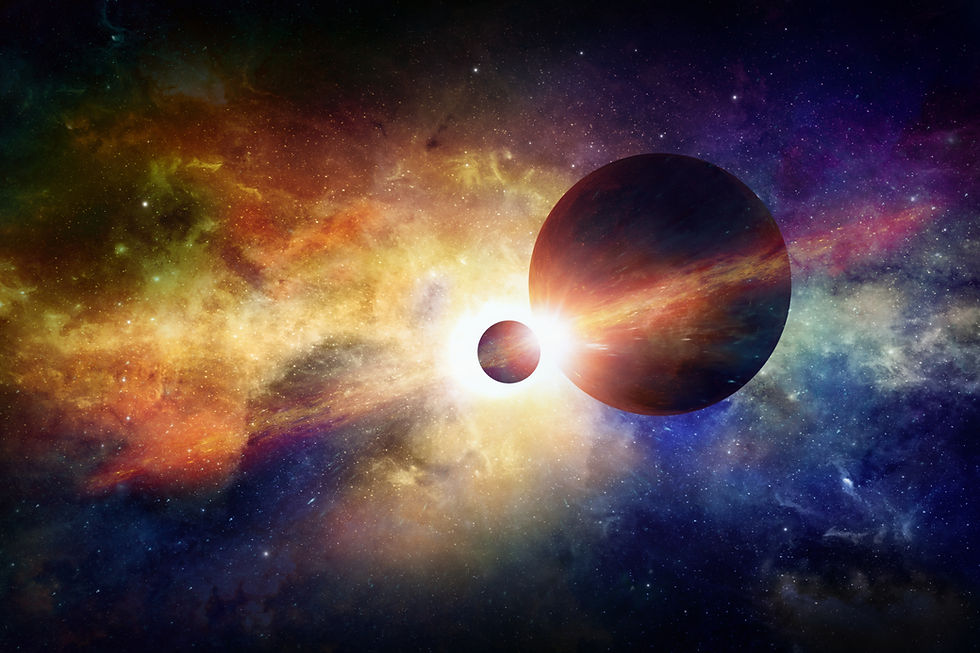Why did God create the Universe?
- Soul

- Dec 21, 2022
- 3 min read
Updated: Dec 13, 2023
Any creative act leads to its own death.
The Biblical authors don't give reason why God created the World, only that God did it in a certain way. According to Gurdjieff, God created the current Universe to 'save his own skin' (that is, the World, God's home) from the inevitable destruction of God's own creative power.
Put simply, the power of God's creative Will, while creative, also guarantees the destruction of the Universe if left unabated. And the force of God's creative Will is what we perceive as the 'flow of time' (the Merciless Heropass), expressed one way in modern science's 'Laws of Thermodynamics'.
It is the flow of time that diminishes the possibilities of the Universe - that is, over time, there is less and less opportunity for something to 'happen' - everything runs down, decays and dies, resulting in 'nothing' at all. So, God had to re-configure universal laws to ensure that there was a force that could commensurately increase the possibilities of the Universe - that is, provide more and more potential for something to happen.
Why is there generally more anguish over a child's death than an elderly person? Perhaps it is because we instinctively know that the elderly person has, to some extent or another, actualised or exhausted all the possibilities given to them. A child, on the other hand, is still full of potential and yet to actualise its possibilities that could give something truly genuine, truly unique, to themselves and the World.
What was the re-configuration of universal laws that gave effect to saving God's World? For Gurdjieff, God's original home was created to run like 'clock-work' - everything precisely automated and functioning perfectly: a well-oiled machine. However, as alluded to above, this led to the loss of possibilities (i.e., nothing really 'new' could enter because of the absolute automaticity) and inevitable destruction, if only gradual, of the World.
God changed the workings to ensure that everything became relatively dependent on everything else, requiring that mutual support (external and internal) was critical to everything's survival. This changed working resulted in the Universe's possibilities increasing through the potentiality of all sorts of 'hazards' and 'risks' acquired in every process and at every scale because of its 'eco-system-like' behaviour.
Strangely enough, this also means that there is a constant need for consciously creative actions to find ways to reconcile the risks and hazards to keep the Universe working in a dynamic balance of simultaneous increasing and decreasing of possibilities.
That forced creative action in every process and at every scale is epitomised in the activity of 'Life', and originates from 'within' - from the depths of consciousness. This is because true creative action is 'conscious choice-making' about 'how to act on and in' the World.
For human life, every moment is a choice from what is possible, to what is probable, to what is inevitable. It is the choices, the application of a relatively 'free will', that can choose to increase the possibilities of a situation - to raise the potential for something new and original to manifest - or simply 'go with the flow', blindly exhausting and destroying them.
It is no coincidence that, in the Bible, God charged Adam (meaning 'Human' in the collective sense) and Eve (meaning 'Life') to take care of the Earth and all creatures upon it. For in Gurdjieff's vision of God's World, conscious beings, like Human Life, are indispensable for the sustainability of the Universe. In that sense, God needs us as much as we need God.
If God is viewed from the perspective of 'Will', rather than a Being, then the theological inconsistencies between Christianity and Islam, indeed, religion and science, are reconciled.




Comments